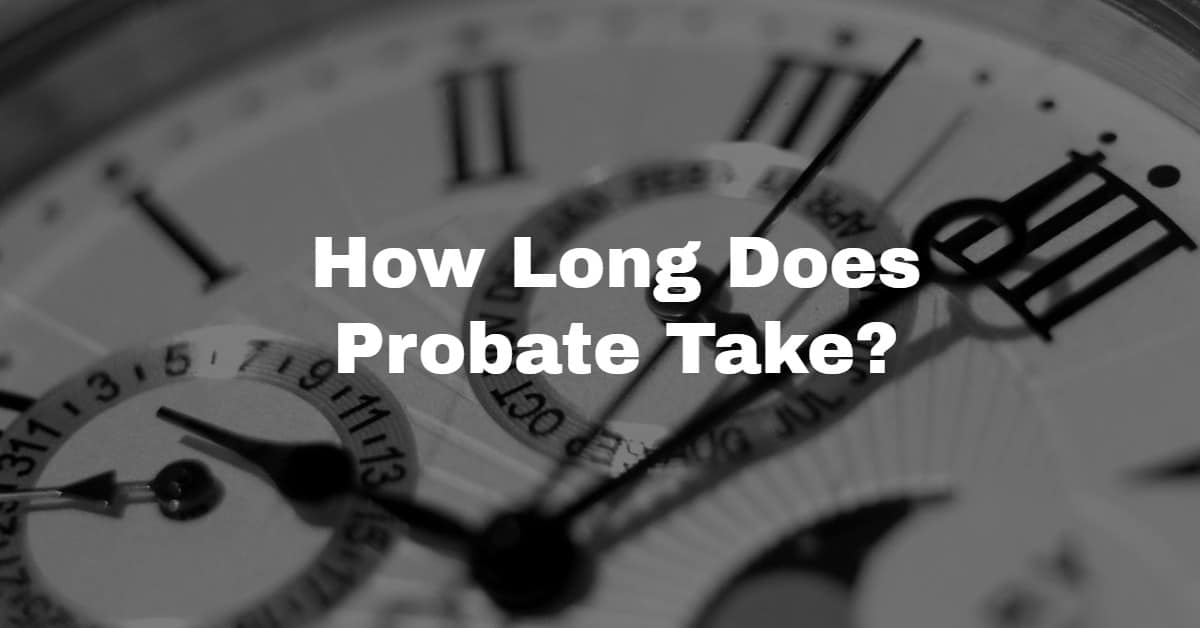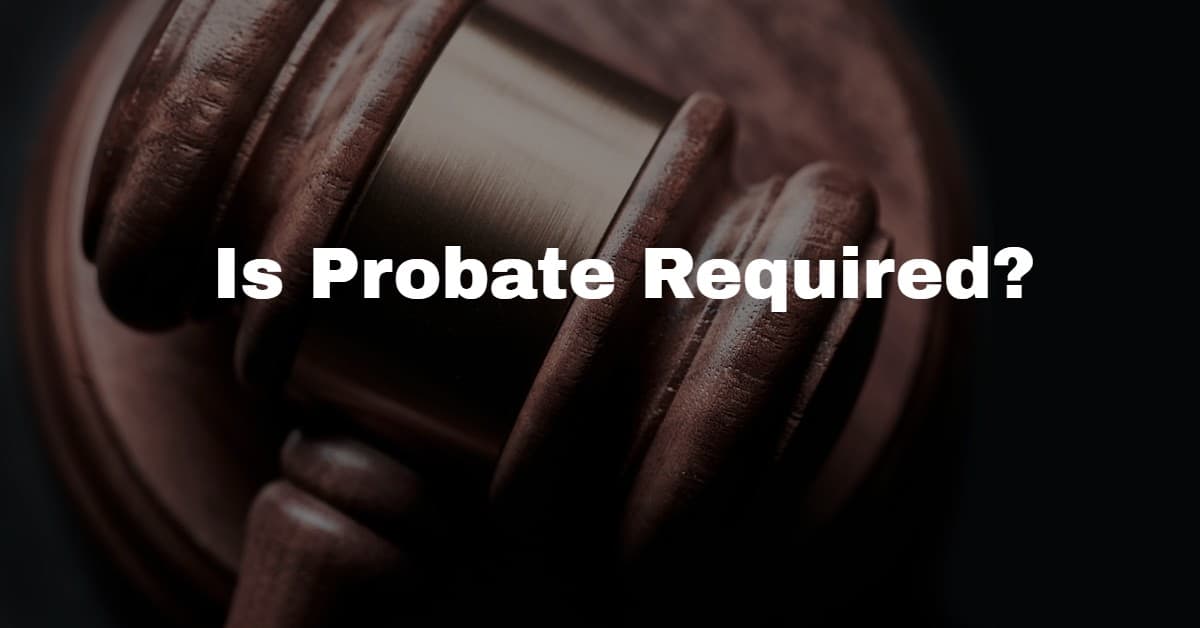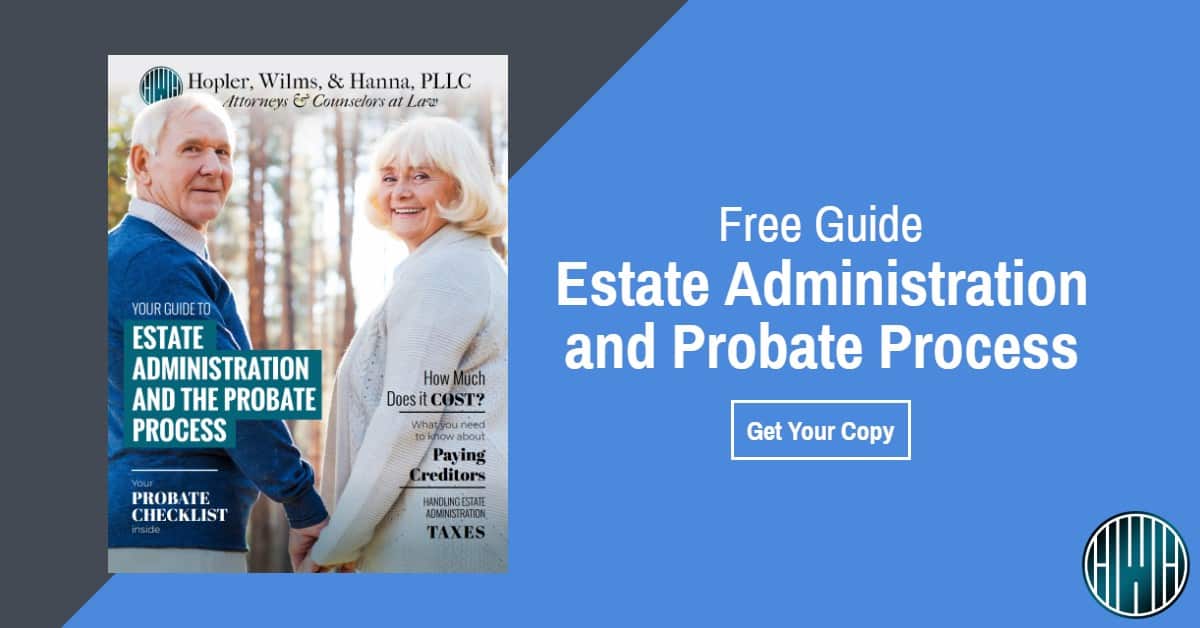Probate, or estate administration, is the court-supervised process of gathering a deceased person’s assets and distributing them to creditors and heirs. Typically, court involvement is minimal unless there is significant dissention between heirs. However, the process can still be daunting, and those left responsible for the estate may have a lot of questions.
Is there a deadline for probate?
Most families want the probate process to be started (and finished) as soon as possible, however, there is no deadline for an estate administration.
In North Carolina, surviving spouses have the right to the first $60,000 of their deceased spouse’s property (before any other children or heirs can take their shares.) This spousal allowance, commonly known as a “Year’s Allowance,” must be filed within one year of the death of the deceased spouse. The spousal allowance is separate from the full estate administration and can be filed before a full administration begins, if one is needed.

There is no real definitive answer to this question. The probate process can take anywhere from a few months to a few years and depends on several factors, including creditors, assets, pending litigation, and the caseload of the Court.
How can I become Executor/Administrator of an Estate?
First, we must establish the difference between an Executor and an Administrator. An Executor is the person who is responsible for probate that has been named in a Last Will & Testament.
An Administrator is a person who is responsible for probate who has not been named in a Last Will & Testament, either because the deceased person did not have a Last Will & Testament, or because the people that were named in the Last Will & Testament were all unable to serve.
If your loved one left a Last Will & Testament, they would have named their Executors in that document. Courts will appoint the person named in the document unless there are serious issues with that person that would prevent them from serving (such as being underage, having a serious criminal history, or being deceased.) If the first person named is unable to perform their duties as Executor for any reason, the next person on the list of Executors will be named as Executor.
If your loved one did not leave a Last Will & Testament or if all of the named Executors in their Last Will & Testament are unable to serve for any reason, you must apply with the Court to become the Administrator.
Any interested person who is qualified to serve (for example, a family member who may inherit property, or a person to whom the deceased may have owed money) can begin the probate process by applying to be the Administrator.
It is important to note that, even though your loved one may have named you as their agent under a Power of Attorney, you do not automatically become the Executor. Once a person passes away, the Power of Attorney becomes void.

In some instances, probate or a full estate administration is not needed and definitely not required. If the deceased person did not have many assets and/or did not own real estate, there may be no need for a full estate administration. In these cases, the Courts can offer expeditious and simpler alternatives to handling the few assets that remain, such as the transfer of a vehicle title, for example.
However, if the deceased person owned real estate or significant financial assets, a full estate administration may be necessary. It is in your best interest to consult with an attorney to ensure the proper kind of estate is opened to prevent complications further down the road.
My loved one owed money to several creditors. How do I handle this?
It is very important to know that once someone is deceased, their loved ones are not personally responsible for their debts. Surviving spouses, however, may be held personally responsible in some situations.
If your loved one owed money to creditors, the debts can be addressed once a full estate administration is opened. Once the estate is opened, a notice will be placed in the local newspaper giving all creditors a chance to come forward and file a claim against the estate for the amount of money owed.
Once there are claims filed, the Executor/Administrator can decide whether the claims should be paid, negotiated, or rejected. It is recommended to have a lawyer/attorney assist with this process.
North Carolina statutes specify the order in which creditors should be paid. It is essential that the claims are paid in the correct order just in case the estate does not have enough funds to pay all of them.
Do I get paid for being Executor/Administrator?
There is potential for the Executor/Administrator to be paid for their work. This payment is known as a commission. The amount will be based on the total amount of estate assets and eligible disbursements at the discretion of the Clerk of Court in the county in which the estate is filed.
How much does probate cost?
The cost of probate depends on the kind of estate that is opened. For a full estate administration, the initial application fee is a flat fee. This is normally $120.00. The Inventory filing fee is based off of the total amount of estate assets, with the minimum filing fee being $15.00. Annual/Final Account filing fees are based on the total amount of property the estate received during the year, with the minimum filing fee also being $15.00.
Costs for the Notice to Creditors varies by newspaper publisher. Other costs associated with probate may include a lawyer/attorney, appraiser, and a tax preparer, to name a few.
What do I do if my loved one owned real property in a state other than North Carolina?
If your loved one owned real property (a home, land, etc.) in another state, it is likely that an estate administration will need to be opened in that state as well. Real property is always governed by the laws of the state in which it is situated.
Beginning probate in a second state is called an “ancillary estate.” You will need to find a lawyer/attorney in that state to assist in the process.
Do I need a lawyer?
A lawyer is not required in order to open an estate, however, it is highly recommended. Lawyers/attorneys are familiar with the Court system and can assist in navigating through the probate process. Retaining a lawyer/attorney can also assist in ensuring full compliance with Court regulations and requirements, such as timely filing of required documents.
Our office routinely works with Courts all over the state of North Carolina. If you are looking to begin the probate process and are seeking guidance, contact our attorneys today for a consultation.


